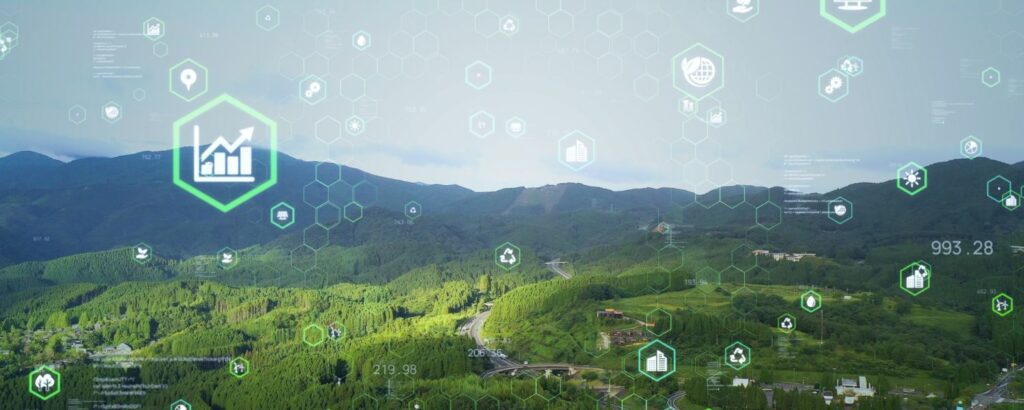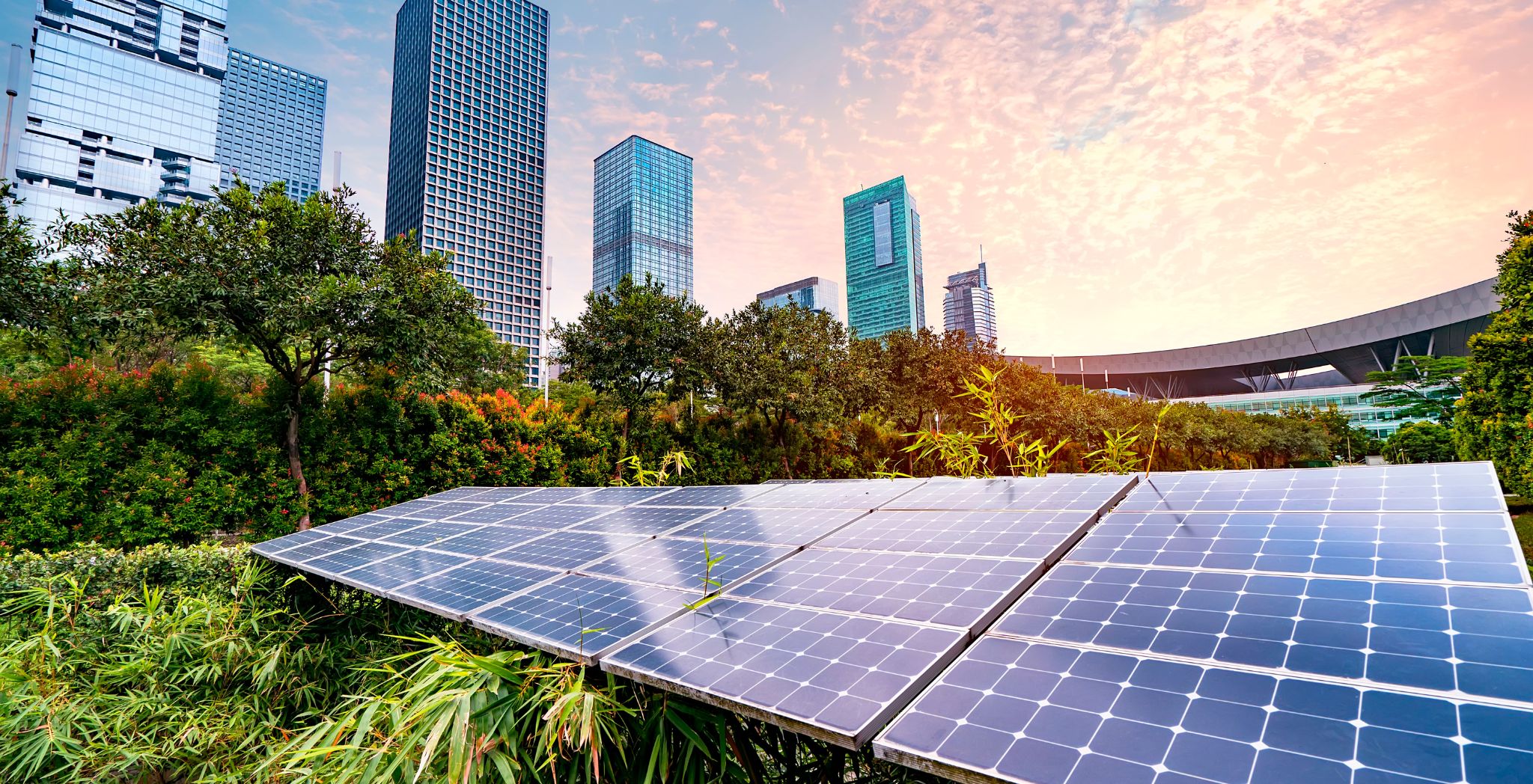As we navigate the complexities of the 21st century, sustainable technology has emerged as a crucial strategy for addressing pressing environmental challenges. These innovations and practices minimize environmental impact, conserve energy and natural resources, and promote ecological balance.
Furthermore, from renewable energy and waste management to water conservation and green building practices, sustainable technology promises to mitigate environmental degradation and offer substantial benefits to businesses and society.
This tells about the various facets of sustainable technology, exploring its definition, examples, business benefits, and prospects. Understanding and embracing sustainable technology is essential for creating a greener, more sustainable future.
What is Sustainable Technology?

Sustainable technology refers to innovations and practices that lower the environmental impact, conserve energy and natural resources, and promote ecological balance. These technologies are designed to meet the needs of the present without the ability of future generations to meet their needs. Sustainable technology encompasses many areas, including renewable energy, waste management, and green building practices.
1. Resource Efficiency
Utilizing resources more efficiently to reduce waste and consumption.
2. Renewable Resources
Prioritizing the use of renewable resources over finite ones.
3. Waste Reduction
Minimizing waste through recycling, reuse, and sustainable production processes.
4. Life Cycle Thinking
Considering the environmental impact of a product throughout the life cycle.
Examples of Sustainable Technology

A. Renewable Energy Technologies
1. Solar Power
Moreover, Solar panels convert sunlight into electricity, reducing reliance on fossil fuels. Sustainable Innovation like solar roof tiles and transparent solar panels make solar energy more accessible and aesthetically pleasing. Companies like Tesla and SunPower are in charge of solar roof products seamlessly integrating into home designs.
2. Wind Energy
However, Wind turbines harness the power of the wind to generate electricity. Offshore wind farms and vertical-axis wind turbines represent advancements in this field. Wind energy companies such as Vestas and Siemens Gamesa are continuously developing more efficient turbines to capture wind energy even in low-wind areas.
3. Hydropower
Small-scale hydroelectric systems can provide renewable energy for communities without the environmental impact of large dams. Innovations in micro-hydropower are making it possible to generate electricity from small streams and rivers.
B. Green Building Technologies
1. Energy-efficient Building Materials
Insulated concrete forms, low-emissivity windows, and green roofs help reduce energy consumption in buildings. Companies like Owens Corning and Saint-Gobain are at the forefront of producing these materials.
2. Smart Thermostats and Lighting
These technologies optimize energy use by adjusting heating, cooling, and lighting based on occupancy and time of day. Products like the Nest Learning Thermostat and Philips Hue’s innovative lighting systems are famous examples.
3. Living Walls and Roofs
Incorporating plants into building designs through living walls and roofs improves insulation and enhances air quality and biodiversity. Companies like Green Roof Technology are pioneering these eco-friendly architectural features.
C. Sustainable Transportation
1. Electric Vehicles (EVs)
EVs produce zero emissions and are becoming more efficient and affordable. Additionally, advances in battery technology are extending their range and reducing charging times. Tesla, Nissan, and General Motors are critical players in the EV market, continually pushing the boundaries of what electric cars can achieve.
2. Public Transportation Innovations
Electric buses, high-speed trains, and bike-sharing programs contribute to reducing the carbon footprint of transportation. Companies like BYD and Bombardier lead the way with electric public transportation solutions.
3. Alternative Fuels
Biofuels, hydrogen fuel cells, and synthetic fuels offer sustainable alternatives to traditional gasoline and diesel. These fuels can significantly reduce emissions and reliance on fossil fuels.
D. Water Conservation Technologies
1. Greywater Recycling Systems
These systems treat and reuse water from sinks, and washing machines for irrigation and flushing toilets. Sustainable Technology Companies like AQUS Water Recycling and Hydraloop are developing residential and commercial greywater systems.
2. Smart Irrigation Systems
These systems use sensors and weather data to optimize water use in agriculture. Companies like Rachio and Netafim offer intelligent irrigation solutions that help save water and improve crop yields.
3. Desalination Technologies
Advances in desalination technology are making it more feasible to convert seawater into freshwater. Companies like IDE Technologies and Desalitech are developing energy-efficient desalination plants.
E. Waste Management Technologies
1. Recycling Innovations
Advanced sorting systems, chemical recycling, and biodegradable materials are transforming waste management. Companies like TerraCycle and Waste Management Inc. are leaders in innovative recycling solutions.
2. Composting
Industrial composting facilities and home composting solutions help reduce organic waste in landfills. Companies like CompostNow and BioBag provide services and products to support composting efforts.
3. Waste-to-Energy
Technologies that convert waste into energy through anaerobic digestion and gasification are gaining traction. Companies like Covanta and Veolia are implementing waste-to-sustainable energy technology solutions globally.
Why Sustainable Technology is Good for Business?

1. Cost Savings
Adopting sustainable technologies can lead to significant cost savings. Energy-efficient systems reduce utility bills, and waste-reduction practices can lower disposal costs. Additionally, for instance, companies that invest in renewable energy often benefit from reduced energy costs over time. Long-term energy and resource consumption savings can offset the initial investment in sustainable information technology.
2. Enhanced Brand Reputation
Consumers are increasingly favouring companies that demonstrate a commitment to technology and sustainability. Businesses that adopt sustainable technologies can enhance their brand reputation, attract eco-conscious customers, and differentiate themselves from competitors. Brands like Patagonia and Unilever have successfully integrated environmental sustainability into their business models, gaining loyal customer bases.
3. Regulatory Compliance
Governments worldwide are implementing stricter environmental regulations. By adopting sustainable technologies, businesses can ensure compliance with these regulations and avoid fines and sanctions. Companies like Siemens and GE are helping industries meet regulatory standards with sustainable technology solutions.
4. Innovation and Competitive Advantage
Sustainable technologies often drive Innovation. Companies that lead in sustainability can gain an advantage by developing brand products or services that meet the growing demand for eco-friendly solutions. Apple and Google, for instance, are investing heavily in renewable energy and sustainable practices, positioning themselves as leaders in Innovation and environmental stewardship.
5. Employee Satisfaction and Retention
Moreover, employees are likely to feel proud of and committed to a company prioritizing sustainability. However, this can lead to higher job satisfaction, improved morale, and better retention rates. Companies like Salesforce and Adobe, known for their vital sustainability initiatives, often see higher employee engagement and satisfaction.
Why is Sustainable Technology Important?

1. Mitigating Climate Change
Sustainable technology plays a crucial role in reducing greenhouse gas emissions. However, renewable energy sources like solar and wind power help decrease reliance on fossil fuels, a significant source of carbon emissions. By adopting sustainable technologies, we can slow the progression of climate change and mitigate its impacts.
2. Conserving Natural Resources
The world’s natural resources are finite, and many are being depleted at an unsustainable rate. Sustainable technologies promote the efficient use of resources, helping to conserve water, minerals, and other essential materials for future generations. Implementing resource-efficient technologies in industries such as mining and manufacturing is critical to this effort.
3. Reducing Pollution
Pollution from industrial processes, transportation, and waste disposal severely affects human health and the environment. Sustainable technologies aim to minimize pollution through cleaner production methods, improved waste management, and the use of non-toxic materials. Innovations in air and water purification areas are essential in reducing pollution levels.
4. Promoting Economic Growth
Sustainable technology can drive economic growth by creating new industries and job opportunities. The renewable energy sector, for instance, has seen rapid growth and has become a significant source of employment. Countries like Germany and China are investing heavily in renewable energy, creating jobs and boosting their economies.
5. Enhancing Quality of Life
Sustainable technology can significantly enhance the quality of life for individuals and communities by reducing pollution, conserving resources, and promoting healthier living environments. For example, access to clean energy and water improves public health and well-being.
Benefits of Sustainable Technology

A. Environmental Benefits
1. Reduced Carbon Footprint
Sustainable technologies reduce greenhouse gas emissions, helping to combat climate change. Adopting renewable energy sources and energy-efficient practices significantly contributes to this reduction.
2. Biodiversity Conservation
Sustainable technologies help preserve biodiversity by minimizing habitat destruction and pollution. Sustainable agriculture practices, for example, reduce the impact on wildlife and natural habitats.
3. Cleaner Air and Water
Technologies that reduce emissions and waste contribute to cleaner air and water, improving public health. Air purifiers and water treatment technologies are essential in maintaining healthy ecosystems.
B. Economic Benefits
1. Job Creation
The sustainable technology sector creates jobs in manufacturing, installation, maintenance, and research and development. For example, the growth of the renewable energy industry has generated millions of jobs worldwide.
2. Economic Resilience
Sustainable practices can help businesses and communities become more resilient to economic and environmental shocks. Diversifying energy sources and implementing efficient resource management practices contribute to this resilience.
3. Resource Savings
Efficient resource use reduces costs and conserves supplies for future use. Businesses that adopt sustainable technologies often see a reduction in operating expenses and an increase in resource availability.
C. Social Benefits
1. Health Improvements
Reduced pollution and waste management improve health outcomes. Cleaner air and water and reduced exposure to harmful chemicals enhance public health.
2. Community Empowerment
Sustainable technologies can empower communities by providing access to clean energy, and other essential resources. Off-grid renewable energy solutions, for example, can bring electricity to remote areas.
3. Equity and Inclusion
Sustainable practices often promote social equity by ensuring all community members access clean resources and technologies. Community-based sustainability projects can bridge the gap between different socio-economic groups.
The Future of Sustainable Technology

1. Advancements in Renewable Energy
The future of sustainable technology is bright, with continuous advancements in renewable energy sources. Solar, wind, and hydroelectric power technologies are becoming more efficient and cost-effective. Innovations like floating solar farms and enhanced geothermal systems hold promise for further expansion of renewable energy. Companies like First Solar and Ormat Technologies are leading the way in developing these new technologies.
2. Smart Cities and IoT
Integrating sustainable technology with innovative city initiatives is set to revolutionize urban living. Internet of Things (IoT) devices can optimize energy use, manage waste, and improve transportation systems, making cities more sustainable and livable. Singapore and Barcelona are already implementing innovative city technologies to enhance urban living.
3. Circular Economy Models
Sustainable technology will drive the shift towards a higher economy, where products are designed for reuse, repair, and recycling (RRR). This model reduces waste and conserves resources, creating a more sustainable economic system. Companies like IKEA and H&M are adopting circular economy principles to reduce environmental impact.
4. Sustainable Agriculture
Advancements in sustainable agriculture technologies, such as precision farming, vertical farming, and lab-grown meat, will play an essential role in meeting the food demands of a growing population with environmental impact. Companies like Bowery Farming and Impossible Foods are at the forefront of these innovations.
5. Green Hydrogen
However, Green hydrogen, produced using renewable energy, has the potential to become the best energy source. It can be used in various applications, from transportation to industrial processes, offering a sustainable alternative to fossil fuels. Companies like Plug Power and Siemens Energy are investing in green hydrogen technology.
6. Carbon Capture and Storage
Technologies for capturing and storing carbon dioxide emissions are evolving, offering a way to mitigate the impact of industries that are difficult to decarbonize. These technologies can capture CO2 from power plants and other industrial sources, store it underground, or use it in different processes. Companies like Carbon Clean Solutions and Climeworks are pioneers in carbon capture technology.
7. Energy Storage Solutions
Advancements in energy storage, such as improved battery technologies and grid-scale storage solutions, will enable better integration of renewable energy into the power grid. However, this will ensure a reliable and stable energy supply despite intermittent renewable sources. Companies like Tesla and LG Chem are leading the development of advanced energy storage solutions.
8. Sustainable Transportation Innovations
Sustainable technologies like autonomous electric vehicles, hyperloop systems, and advanced public transportation networks will shape the future of transportation. These innovations will reduce emissions and improve efficiency in the transportation sector. Companies like Waymo and Hyperloop One are pioneering these futuristic transportation solutions.
Conclusion
Sustainable technology represents a transformative approach to tackling environmental challenges while fostering growth and social well-being. By adopting sustainable technologies, businesses and individuals can contribute to a healthier planet, enhance resilience to future challenges, and reap numerous benefits.
The future of sustainable technology is promising, with continuous advancements offering innovative solutions for a sustainable and equitable world. Embracing sustainable technology is not merely a trend but a necessary evolution in how we approach development and consumption.
As we collectively adopt and innovate in sustainable technology, we pave the way for economic growth and environmental stewardship to coexist, ensuring a vibrant planet for future generations. VectorGlobe embodies this vision, driving the adoption of sustainable technologies to create a lasting positive impact. By aligning with VectorGlobe, we join a movement dedicated to building a more sustainable and prosperous world.

